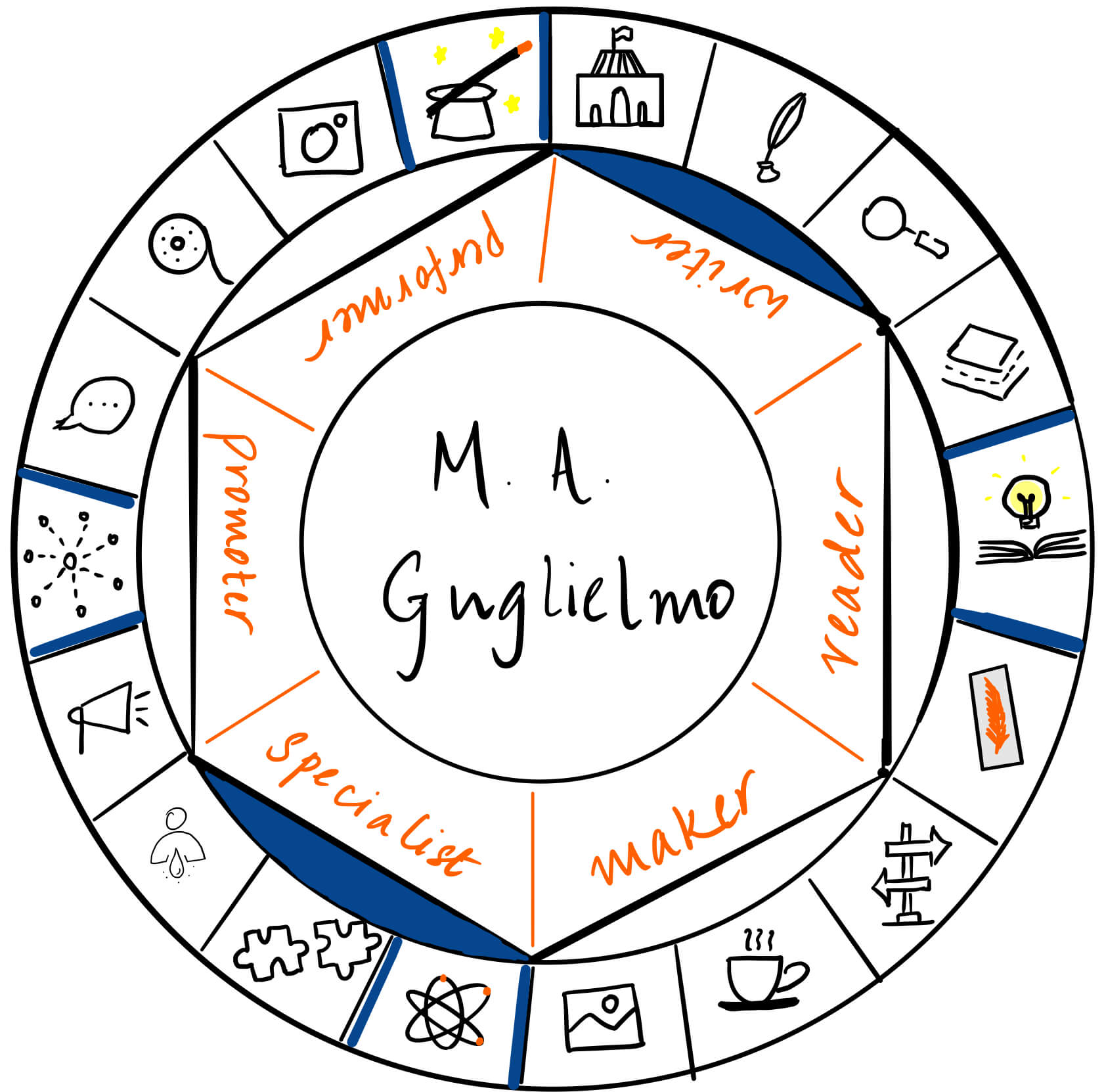
Diversity in books is something that I notice more and more nowadays. Recently, I was on Alex’s blog on International Women’s Day and it was interesting to me to learn about male writers creating female characters. I have written stories from my perspective and, with the whole diversity narrative, I wonder how authors do it – how do they get into the shoes of people that they are not? Do they do research? Are there people they turn to who can answer their questions, not just about culture but also stereotypes, typical problems people might face and so on. What is it like to write the other? How does one build diverse characters?
I am not an author. But I know M A Guglielmo who writes about LGBTQ+ characters in her books. I posed questions similar to the ones above to here and I am excited to share her answers in this guest post on Creator’s Roulette.
On Writing Diverse Characters – The Other
As a fantasy author, I know that creating entire worlds that are different than the one around us is a major component of a successful story. In addition to focusing on plot, dialogue, characters and theme, worldbuilding has to be seamlessly integrated into speculative fiction. But no matter how far from realistic fiction our stories stray (like sentient trees or lovers who transform from beasts of prey into attractive humans just in time for a sizzling sex scene), in the end our characters and worlds are still reflections of our own experiences and world view.
The problem is that for many English-language authors, that worldview can be pretty narrow. Many epic fantasy worlds have for years been based on popular misconceptions of medieval Northern Europe. Urban fantasies have often been set in major American cities devoid of anyone who isn’t white, abled-bodied, and heterosexual.
Fortunately, things are changing in speculative fiction. Led by #ownvoices authors, hugely successful novels like N.K. Jemisin’s Broken Earth Trilogy and the Binti series by Nnedi Okorafor have addressed issues of racial identity and oppression. LGBTQ characters and themes have been explored in novels like The Priory of the Orange Tree by Samantha Shannon and This Is How You Lose the Time War by Amal El-Mohtar and Max Gladstone. Other recent works from historically marginalized cultures and identities include The Daevabad Trilogy by S.A. Chakraborty, and The Sixth World series by Rebecca Roanhorse.
From a craft perspective, creating worlds and characters that differ from our own experiences and backgrounds can be daunting but rewarding. For authors from traditionally marginalized groups, the #ownvoices movement has provided much-needed support and attention to wonderful stories that haven’t made it to large audiences previously. Not all authors from these backgrounds may want to write only from their own experience, however, and they may choose to draw from the dominant culture or explore characters from other marginalized communities.
For authors writing from a position of privilege, incorporating characters and cultural traditions outside their backgrounds can allow their stories to reflect the diversity of the world around them. However, there is potential for writing characters and settings we perceive as the ‘other’ badly, and causing harm through the sin of commission, while trying to avoid the sin of omission.
Writing characters well is a critical skill for writers, requiring active study and practice. Writing diverse characters whose background differs from our own requires different kinds of research, listening to voices from those communities, and again, a lot of practice. Drawing inspiration from cultures other than our own also carries a similar responsibility.
So what are some strategies for writing the other?
# 1 Self Reflection

Perhaps the first is some self-reflection on our own backgrounds and internal assumptions. For most English-language writers (including people from historically marginalized communities), the dominant culture impacts our view of the world, and will exert an influence over any worlds we create. Marriage, for example, evokes a visual image of a young, healthy couple who’ve developed a deep romantic attraction committing themselves to a life-long relationship and sexual monogamy, with a shared goal of having children. That’s not what marriage is for many people in the world today, or historically. Gay couples marry, older adults chose to wed long after their children are grown, and couples enter into marriage based on their parents’ choices for them. Historically, enslaved African Americans were prohibited from marriage. Being aware that marriage and many other cultural constructs mean different things to different people can help authors develop rich and internally consistent worlds in their writing.
# 2 Research
Research, of course, is an important part of writing. Writers of historical speculative fiction might have to do a deep dive into the time periods their stories are set in, and even in contemporary fantasy, getting the details right helps readers immerse themselves in the story. Researching diverse characters can help inform authors, but it’s critical to understand that reading about someone else’s experiences is not the same thing as sharing those experiences. You can get all the details right, and totally miss the point. Especially if you are exploring topics of particular sensitivity and emotional impact to a community, it’s critical to understand that you might not be the right author to delve into that topic, or even use it as background material. For example, a non-black person studying anti-black racism and the historical legacy of slavery in the US before writing an imagined romance between an enslaved black woman and a slave-owner doesn’t make that story any less offensive.
What about sensitivity readers? These are beta readers who go through a manuscript, bringing the viewpoint of their background and training to point out possible problematic words or scenes, and help the author improve their work. These unsung heroes of editing can be immensely helpful, but in the end the book is the author’s work and the author’s responsibility. Also, people from historically marginalized communities have as many different opinions and viewpoints as people from more privileged backgrounds. A second-generation US immigrant from China might feel differently about the depiction of a character from her background than someone currently living in China, for example.

Interacting with people from different backgrounds and learning about different cultures can also help inform authors. Not everyone can easily expand their circle of friends, or travel internationally. But actively trying to listen and learn from people different from you is a good option, and most of us have access to social media. With the privilege of having English be one of the world’s major languages, even monolingual writers can chat and learn from people all over the world.
There have been ferocious controversies over diversity issues in novels over the past few years. It’s important to realize that while you may have the right to write whatever you want, everyone else also has the right to criticize what you put on the page. Art has power, after all. Certain tropes aren’t only tired and cliched, they are likely to offend a good many readers, and to paraphrase, a good author never insults anyone unintentionally.
Some of these tropes are seen so often they have catchphrases. “Bury your gays” generally refers to a single LGBTQ character who is killed off to advance the plot. “Magical Negro” usually involves having one black (or indigenous) character who enables the hapless white hero to succeed, then dies tragically while saving the main character. “Magic penis” is when mind-bending orgasms from the male hero instantly resolve the heroine’s trauma over being raped. Other stereotypes are far more sinister and harmful. In an era of worsening hate and discrimination, having your only Muslim character be a terrorist, or your only Latino character be a gang member, isn’t just a trope, it’s an attack.
# 3 Engage in the Community
Lastly, it’s important not only to be a good writer, but to be a good member of the writing community. Read and support other authors, particularly those who have a harder road than many of us travel. Speak up for diversity, offer a helping hand to newer authors, and try to make the world of literature a better place.
What are ways that you’ve felt most represented (whether that be race, sexuality, queerness, gender, etc) and why was it so good/what made that representation accurate?
I hope M A Guglielmo’s post was as informative to you as it has been to me.
Want to connect with M A Guglielmo? Here are ways to find her:

Cover image: Photo by Matthew Fassnacht on Unsplash
Photo by Nick Morrison on Unsplash

This was a great and really helpful post! writing diverse characters can be hard sometimes but these 3 tips are really great, i’ll be sure to apply them in the future
! 🙂
This is such a great topic and post. Saving this one for future reference. Thanks for the enlightenment!